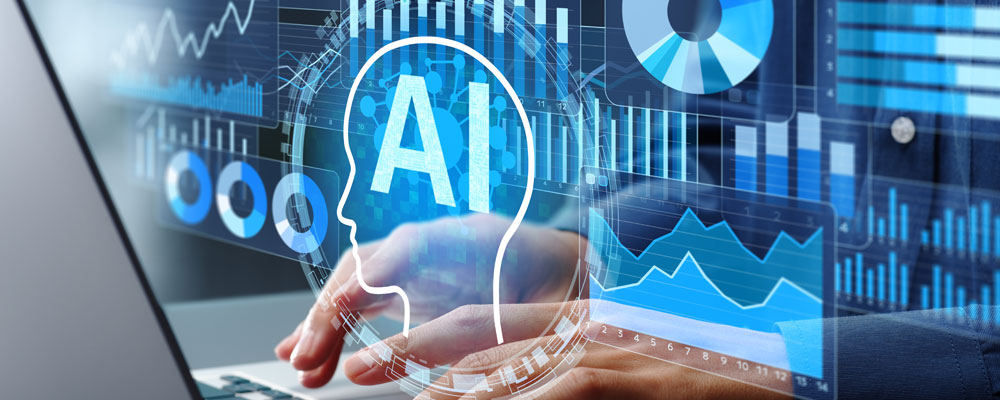
The Future is Now: AI Marketing Trends to Watch in 2025
AI is Essential, Not Optional: By 2025, AI is no longer just a competitive advantage but a necessity for businesses, with explosive market growth driven by generative AI.
AI Reshapes Everything: It’s fundamentally changing marketing through hyper-personalization, AI-driven content creation, predictive analytics, and extensive automation, freeing up marketers for strategic work.
Embrace & Adapt: While offering huge benefits in efficiency and ROI, AI also brings challenges like data privacy and the need for training; success lies in human-AI collaboration and continuous learning.
Estimated reading time: 12 minutes
Ever feel like artificial intelligence (AI) is everywhere? From your smart speaker to personalized recommendations on your favorite streaming service, AI is quietly, yet powerfully, reshaping our world. And nowhere is this transformation more evident than in the dynamic realm of marketing.
Gone are the days when AI in marketing was just a futuristic concept or a “nice-to-have” tool for tech giants. By 2025, AI isn’t just an advantage—it’s becoming an absolute necessity for businesses of all sizes to stay relevant and competitive. Think of it as the new cornerstone of how companies connect with their customers.
So, what does this mean for you, whether you’re a marketing professional, a small business owner, or just curious about the next big thing? It means understanding how AI is fundamentally changing the game. In this article, we’ll explore the exciting trends shaping AI marketing in 2025, how it’s reshaping strategies, the incredible benefits it offers, and some important challenges to keep in mind. Get ready to peek into the future of digital marketing – it’s already here!
AI is Exploding in Marketing: Are You Ready?
Let’s talk numbers for a moment, but don’t worry, we’ll keep it simple. The AI in marketing industry is absolutely booming. Just imagine, in 2020, it was valued at around $12 billion. By 2025, that number is expected to jump to over $47 billion, and by 2028, it could exceed a staggering $107 billion! This isn’t just growth; it’s an explosion, signaling a massive shift in how businesses operate.
A big part of this growth comes from something called generative AI. If you’ve heard of tools like ChatGPT, you’ve already encountered generative AI. Simply put, it’s AI that can create things—like human-like text, images, or even video scripts—from simple prompts. This ability to generate content quickly and efficiently is a huge game-changer for marketers.
It’s clear that businesses are catching on. In 2024, a whopping 78% of organizations reported using AI, a significant leap from just 55% the year before. And nearly all leading businesses (over 91%) have already invested in AI. Within marketing specifically, about 88% of digital marketers say they use AI in their daily tasks. That’s almost everyone!
However, there’s a catch. While many are adopting AI, there’s a noticeable “skills gap.” Think of it like this: many people have bought a fancy new car, but not everyone has taken the time to learn all its advanced features or how to drive it safely at top speed. A surprising 70% of marketers say their employer doesn’t offer training for generative AI. This means a lot of people are using powerful tools without fully understanding how to get the most value out of them, or how to use them safely and ethically. This gap is a big challenge that needs to be addressed for AI to truly reach its full potential.
How AI is Changing Marketing: The Big Shifts
AI isn’t just tweaking existing marketing methods; it’s fundamentally redesigning them. Here’s how:
1. Hyper-Personalization at Scale: Marketing Just For You
Remember when getting an email with your name in the subject line felt special? That’s old news. Today, consumers expect brands to know them, understand their needs, and offer them exactly what they want, when they want it. AI makes this “hyper-personalization” possible for millions of people at once.
Imagine Netflix recommending a show you’ll love, or Amazon suggesting products you actually need. AI accomplishes this by analyzing vast amounts of data about your past interactions, preferences, and behaviors. It then uses these insights to customize everything from the products you see on a website to the subject lines in your emails. This isn’t just about being friendly; it’s about being relevant. In fact, studies show that up to 80% of shoppers are more likely to buy from companies that offer these personalized experiences. AI is the engine that drives this one-to-one marketing on a massive scale.
2. AI-Driven Content Creation & Optimization: Your Creative Assistant
Creating engaging content—blog posts, social media updates, email newsletters, even video scripts—is time-consuming. This is where generative AI truly shines as a creative assistant. It can rapidly produce drafts of various marketing materials. Need five different headlines for an ad? AI can generate them in seconds. Want a blog post outline on a specific topic? Done.
Tools like ChatGPT, Jasper.ai, and Claude are helping marketers produce content faster (93% report this benefit) and brainstorm ideas more efficiently. But here’s the crucial part: AI isn’t replacing human creativity; it’s augmenting it. Think of AI as handling the first draft or generating ideas, freeing up marketers to focus on strategy, refining the content to match the brand’s unique voice, and ensuring it’s authentic and impactful. Human oversight remains essential to ensure quality and prevent “AI Shovelware”—poorly written or inaccurate content.
3. SEO Evolution: Getting Found by AI
Search Engine Optimization (SEO) used to be all about keywords and getting your website to rank high on Google. However, as AI becomes increasingly intelligent, particularly with features like Google’s “AI Overviews,” SEO is evolving. Now, it’s less about just keywords and more about providing clear, concise, and authoritative answers that AI can easily understand and summarize.
This has led to new terms like “Generative Engine Optimization” (GEO) and “Answer Engine Optimization” (AEO). Essentially, your content needs to be optimized not just for human readers, but for AI’s understanding. This means creating well-structured content, providing factual and cited information, and writing in a natural, conversational style that AI assistants and search engines can easily digest. SEO isn’t dead; it’s just evolving to be smarter and more focused on providing direct answers.
4. Predictive Analytics: Your Marketing Crystal Ball

Wouldn’t it be great to know what your customers will want next, or how a campaign will perform before you even launch it? AI-powered predictive analytics acts like a marketer’s crystal ball. By analyzing vast amounts of past data, AI can forecast future trends, predict customer behavior, and even optimize aspects such as pricing or lead scoring.
For example, Amazon uses predictive analytics to anticipate what products you’ll buy and stocks them closer to you, speeding up delivery. Airlines use it to predict flight demand and adjust prices. For marketers, this means moving from reacting to what happened in the past to proactively shaping the future. It helps you make smarter, data-driven decisions that can significantly boost sales and improve customer loyalty.
5. Automation of Marketing Workflows: Freeing Up Your Time
Let’s face it, marketing involves a lot of repetitive tasks: data entry, scheduling social media posts, sending out routine emails, or generating basic reports. AI is a master of automation, taking over these monotonous jobs. This is a huge win for marketers, with 83% reporting that AI frees up their time for more strategic and creative work.
Imagine AI handling 44% of your SEO tasks or managing 85% of customer service interactions (like Salesforce does!). This isn’t about AI replacing people; it’s about AI handling the grunt work so humans can focus on what they do best: thinking strategically, developing innovative campaigns, building relationships, and solving complex problems. It’s fundamentally “rewiring” how marketing teams operate, allowing them to be more efficient and impactful.
What’s Next? Emerging AI Marketing Trends to Watch
The evolution of AI in marketing is relentless. Here are some exciting trends that will gain even more traction in 2025 and beyond:
1. The Rise of AI Agents: Your Super Assistants
While current AI tools often handle single tasks, “AI agents” are the next big thing. Think of them as super assistants that can manage entire projects, not just individual steps. They can pull information from different systems, understand the whole customer journey, and proactively take action to meet customer needs. This is a significant leap towards AI that can understand, learn, and complete complex tasks almost like a human.
2. Advanced Ad Optimization: The End of “Bad Creative”
Ever see an ad that just doesn’t resonate with you? AI is working to make those a thing of the past. By 2025, AI will be able to predict how well an ad will perform before it even launches. It can generate countless variations of ad copy and visuals, constantly refining them to ensure they hit the mark with specific audiences. This means less wasted ad spend and more effective campaigns. Plus, as the internet moves towards a “cookieless world” (where traditional tracking methods are disappearing), AI will be crucial for still delivering personalized ads and measuring their success accurately.
3. Evolving Conversational AI: Smarter Chatbots
Chatbots are no longer just for answering simple FAQs. In 2025, they’re becoming sophisticated sales and engagement engines. Imagine a chatbot that not only answers your questions but also recommends products, completes transactions, and even understands visual cues (like identifying a product in a photo you send). By 2025, it’s predicted that 70% of customer interactions will involve advanced AI technologies like these, saving companies billions of hours in customer service annually.
4. Immersive Marketing Experiences (AR/VR): Step Inside the Brand
Artificial Reality (AR) and Virtual Reality (VR) are no longer just for gaming; they’re becoming powerful marketing tools. AI enhances these experiences by recognizing objects and scenes in real-time. This means you could virtually “try on” clothes using your phone’s camera, or explore a virtual showroom from your living room. These immersive experiences create deeper engagement and can significantly boost sales by making products feel more tangible and personal.
5. Redefining Lead Magnets: Personalized Value
Remember those generic e-books or whitepapers offered in exchange for your email address? By 2025, these “lead magnets” will feel a bit outdated. Why? Because generative AI can give people instant answers to many questions. The new trend is towards “personalized incentives”—think AI-generated reports based on your specific data, interactive quizzes that offer tailored advice, or customized video messages. The goal is to offer immediate, unique value that makes people truly want to engage with your brand.
The Good and The Tricky Parts: Benefits and Challenges
The integration of AI into marketing brings incredible benefits, but also some important considerations:
The Good (Benefits):
- Increased Efficiency: AI automates repetitive tasks, freeing up marketers to focus on strategy and creativity.
- Better ROI & Cost Savings: AI-driven strategies can lead to a 20-30% increase in marketing ROI, reduce customer acquisition costs by up to 50%, and cut campaign costs by 30%.
- Deeper Customer Insights: AI processes vast amounts of data to give you unparalleled understanding of your customers, leading to better personalization and higher conversion rates.
- Improved Customer Satisfaction: Personalized experiences and instant support from AI can significantly boost how happy your customers are.
The Tricky Parts (Challenges & Risks):
- Data Privacy & Security: AI relies on data, so ensuring customer data is collected, stored, and used ethically and securely is paramount. Compliance with privacy laws like GDPR is crucial.
- Bias in AI Algorithms: If the data used to train AI is biased (e.g., only shows certain demographics), the AI can perpetuate and even amplify those biases, leading to unfair marketing outcomes. Human oversight is vital to prevent this.
- Content Accuracy Issues: While AI is powerful, it can sometimes generate inaccurate or misleading content. It’s essential to have human review processes in place to ensure everything published is factual and aligns with your brand.
- The Need for AI Training: As mentioned earlier, many marketers lack formal training in AI. This gap can lead to underutilized tools or even unsafe use.
- Maintaining Consumer Trust: With so much AI-generated content floating around, consumers are becoming wary. Many want AI-generated content to be clearly labeled. Transparency is key to building and maintaining trust with your audience.
Conclusion: Navigating the AI-First Marketing Era
By 2025, AI is undeniably an indispensable force in marketing. It’s not just a tool; it’s a fundamental shift that enables unprecedented personalization, revolutionizes content creation, and empowers smarter decision-making. The emerging trends point to an even more intelligent, efficient, and deeply connected future for marketing.
While the benefits are compelling, successfully navigating this AI-first era requires more than just adopting new technology. It demands a commitment to continuous learning, establishing robust ethical guidelines, and prioritizing data privacy. The future of marketing isn’t about AI replacing humans; it’s about a powerful partnership where human creativity, strategic thinking, and ethical judgment are powerfully augmented by intelligent AI systems. Embrace this symbiotic relationship, invest in both technology and your team’s skills, and you’ll be well-positioned to lead and thrive in the evolving digital marketing landscape.
Frequently Asked Questions (FAQs)
AI marketing utilizes artificial intelligence to enhance your marketing strategy, making it smarter and more effective. Think of AI as a super-powered assistant that can analyze vast amounts of customer data, predict what customers might want, create content, and automate repetitive tasks. This helps businesses understand their customers better, deliver more personalized experiences, save time, and ultimately get better results from their marketing efforts.
No, AI is not expected to replace marketers entirely. Instead, it’s transforming the role of marketers. AI excels at handling repetitive, data-intensive, and analytical tasks, freeing up human marketers to focus on higher-level strategic thinking, creativity, building relationships, and ethical oversight. The future of marketing is about human-AI collaboration, where AI augments human capabilities, making marketers more efficient and impactful.
There are many ways to start! Since many marketers prefer online learning, you can look for online courses, webinars, and workshops specifically on AI in marketing or generative AI. Reading industry blogs (like this one!) and reports, following AI marketing experts on social media, and experimenting with free or trial versions of AI tools are also great ways to get hands-on experience and build your knowledge.
The most significant risks generally fall into a few categories:
Data Privacy: Ensuring you’re handling customer data ethically and securely, complying with privacy laws.
Bias: AI can unintentionally perpetuate biases present in its training data, resulting in unfair or discriminatory marketing practices. Human review is crucial.
Accuracy: AI-generated content can sometimes be inaccurate or misleading, which can damage your brand’s reputation if not carefully reviewed.
Trust: Consumers are increasingly wary of AI. Being transparent about when AI is used and prioritizing ethical practices is crucial for maintaining customer trust.
